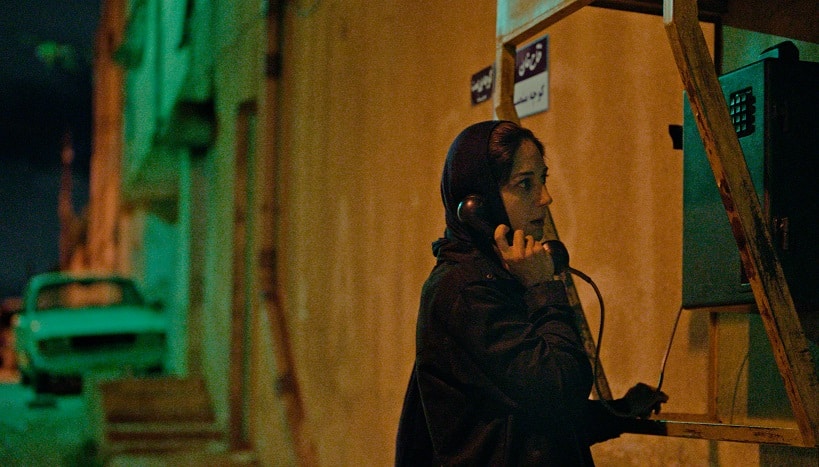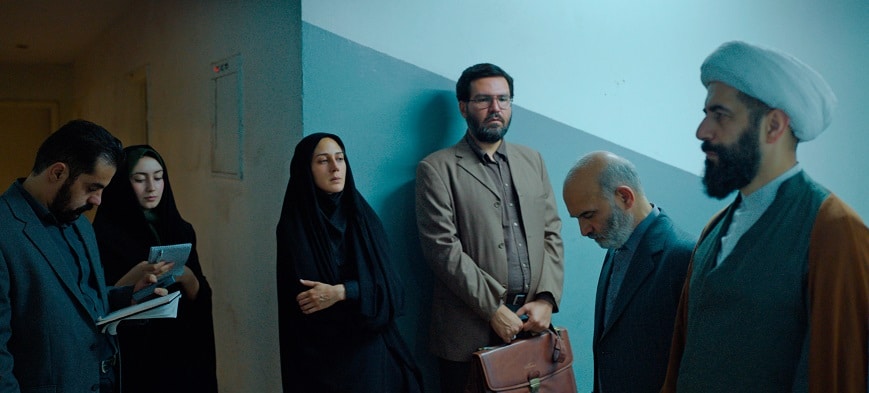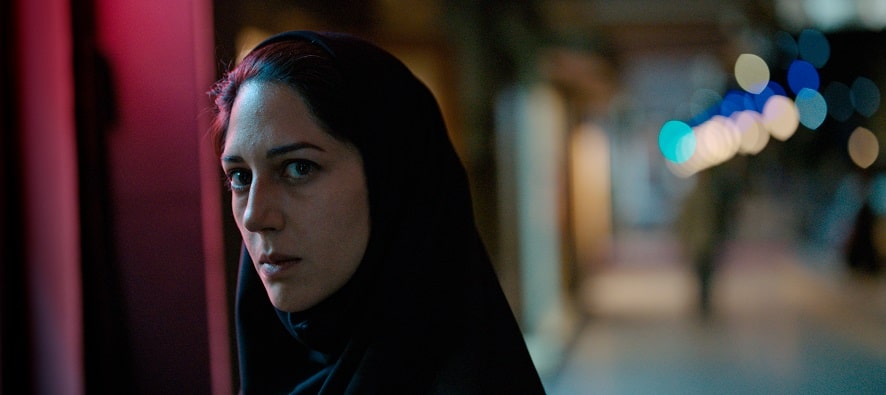The story: Iran 2001, a journalist from Tehran dives into the most infamous suburbs from the holy city of Mashhad to investigate a series of feminicides. She will quickly realize that the local authorities are in no hurry to see the case solved. These crimes would be the work of a single man, who claims to purify the city of its sins, attacking prostitutes at night.
لقصة: إيران 2001 ، صحفي من طهران يغوص في الضواحي الأكثر شهرة من مدينة مشهد المقدسة للتحقيق في سلسلة من جرائم قتل النساء. ستدرك بسرعة أن السلطات المحلية ليست في عجلة من أمرها لرؤيتها القضية تحل. ستكون هذه الجرائم من صنع رجل واحد يدعي تطهير مدينتها الذنوب ومهاجمة البغايا ليلا.

Director's Intentions: NIGHTS OF MASHHAD portrays Saeed Hanaei, one of the serial killers the most famous in Iran. More generally, it is also a criticism of the Iranian society especially since the assassin is a very religious man and a citizen above suspicion. I was still living in Iran in the early 2000s, when Saeed Hanaei preyed on prostitutes in the holy city of Mashhad. He managed to kill 16 women before being arrested and tried. It is during the trial that his story really appealed to me. In a normal world, it is obvious that a man who murdered 16 human beings would be considered guilty. But, in Iran, it was different: part of the public opinion and the media more conservatives have taken to praising Hanaei as a hero. They were convinced that he had only done his religious duty, which was to clean the streets – in other words, to murder these “impure” women. That's when I got the idea of making a film. I had no intention of directing a serial killer film. On the other hand, I wanted make a film about a society that has become a serial killer. The film tackles misogyny deeply rooted in Iranian society, which is not particularly religious or political, but cultural. Misogyny is spreading in all social classes through people's habits. In Iran, we have a tradition of hatred towards women, which often results in terrible dramas. It's that that reveals, in the most scathing way, the trajectory of Saeed Hanaei. She gives back necessary to deliver several points of view that show a diversity of opinions emanating from Iranian society – Hanei's supporters and opponents.
نوايا المخرج: ليالي مشهد يصور سعيد هاني أحد القتلة المتسلسلين الأكثر شهرة في إيران. بشكل عام ، إنه أيضًا انتقاد لـ المجتمع الإيراني خاصة وأن القاتل رجل متدين جدا ومواطن فوق الشبهات. كنت لا أزال أعيش في إيران في أوائل العقد الأول من القرن الحادي والعشرين ، عندما اعتدى سعيد هنائي على المومسات في مدينة مشهد المقدسة. تمكن من قتل 16 امرأة قبل اعتقاله ومحاكمته. إنه خلال أن قصته جذبتني حقًا. في عالم عادي ، هو كذلك من الواضح أن الرجل الذي قتل 16 شخصا سيعتبر مذنبا. لكن الأمر مختلف في إيران: جزء من الرأي العام ووسائل الإعلام واتجه المزيد من المحافظين إلى مدح هاني كبطل. كانوا مقتنعين أنه قام فقط بواجبه الديني ، وهو تنظيف الشوارع - بعبارة أخرى ، لقتل هؤلاء "النجسات". هذا عندما حصلت فكرة صنع فيلم. لم يكن لدي أي نية لإخراج فيلم سفاح. من ناحية أخرى ، أردت صنع فيلمًا عن مجتمع أصبح قاتلًا متسلسلًا. يتناول الفيلم كراهية النساء متجذرة بعمق في المجتمع الإيراني ، وهي ليست كذلك بشكل خاص ديني أو سياسي ، لكن ثقافي. ينتشر كراهية النساء في كل مكان الطبقات الاجتماعية من خلال عادات الناس. في إيران ، لدينا تقليد من الكراهية تجاه المرأة ، والتي غالبًا ما تؤدي إلى أعمال درامية مروعة. إنه ذلك الذي يكشف ، بأكثر الطرق قسوة ، مسار سعيد هاني. هي ترد ضرورية لتقديم عدة وجهات نظر تظهر تنوعًا في الآراء منبثق من المجتمع الإيراني - أنصار هاني ومعارضه.

INTERVIEW WITH ALI ABBASI You were born in Iran and you lived there at the time of the killing spree of Saeed Hanaei and his arrest in 2001. What fascinated you in that case ? I still had ties in Iran, but in 2001 I was settling in Europe to study there. At that time we had a president reformist, Mohammad Khatami, who had opened up the political and cultural space, so well that real hope was born. And then there were the attacks of September 11 and, previously, Saeed's killing spree and arrest. These events are not related, but they seemed to go beyond fiction, like when you can no longer make the difference between reality and Hollywood cinema. I was not so interested in the case of the murders that had occurred a year earlier because the The phenomenon of serial killers is not uncommon in Iran. When you know Iran, this It is not surprising that the country is relatively plagued by crime. I have I started to take an interest in the case when we began to consider Saeed as a hero – and that it was said that he carried out his religious duty by assassinating prostitutes on the streets of Mashhad. Here is a guy who had committed countless feminicides – and people wondered if he had done the right thing or not.
مقابلة مع ALI ABBASI لقد ولدت في إيران وعشت هناك وقت موجة القتل سعيد الهنائي واعتقاله عام 2001. ما الذي أدهشك في هذه الحالة ؟ لا يزال لدي علاقات في إيران ، لكن في عام 2001 كنت مستقرًا أوروبا للدراسة هناك. في ذلك الوقت كان لدينا رئيس الإصلاحي محمد خاتمي الذي فتح المجال السياسي والثقافي جيداً ولد هذا الأمل الحقيقي. وبعد ذلك كانت هناك هجمات 11 سبتمبر ، في السابق ، فورة قتل واعتقال سعيد. هذه الأحداث ليست كذلك ذات صلة ، لكن يبدو أنهم تجاوزوا الخيال ، مثلما لم يعد بإمكانك إنشاء ملف الفرق بين الواقع والسينما الهوليوودية. لم أكن كذلك مهتم بقضية جرائم القتل التي حدثت قبل عام لأن ظاهرة القتلة المتسلسلين شائعة في إيران. عندما تعرف إيران ، هذا ليس من المستغرب أن تعاني البلاد نسبياً من الجريمة. لدي بدأت في الاهتمام بالقضية عندما بدأنا نعتبر سعيدًا البطل - وقيل أنه أدى واجبه الديني بالاغتيال بائعات الهوى في شوارع مشهد. هذا هو الرجل الذي ارتكب عدد لا يحصى مبيدات النساء - وتساءل الناس عما إذا كان قد فعل الشيء الصحيح أم لا.



